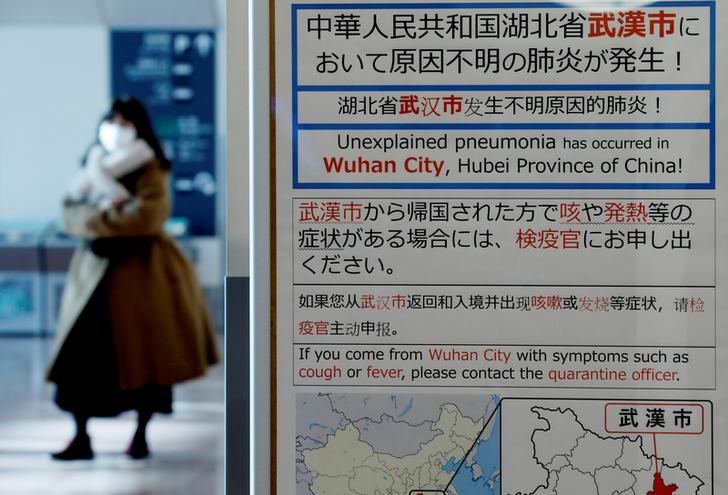 Japan temporarily restricts any incoming foreigner, especially from Wuhan, amid the coronavirus outbreak. (Image via Japan Today)
Japan temporarily restricts any incoming foreigner, especially from Wuhan, amid the coronavirus outbreak. (Image via Japan Today)
Japan restricts foreigners amid coronavirus
On Friday, the Japanese government announced that it will temporarily restrict foreigners who have visited Hubei Province, Central China, from entering the country. The step was taken to prevent further outbreak of the novel coronavirus. The restriction went into effect on Saturday.The restriction includes foreigners who have stayed in Hubei Province within two weeks before they arrive in Japan, even if they do not show any pneumonia symptoms. It was revealed that some of them who was tested positive for the virus did not show any symptom as well.
Holders of Chinese passport issued in Hubei will also be restricted from entering Japan.
The Prime Minister of Japan, Shinzo Abe, said that the policy will be applied only for the time being, amid the outbreak of novel coronavirus from Wuhan, coded 2019-nCoV. The Japanese government plans to send the fourth chartered flight to Wuhan next week to evacuate the last batch of Japanese nationals in Wuhan.
Initially, the government wanted the returnees to pay 80,000 yen each. Nonetheless, it reversed its demand and decided to shoulder the cost instead.
Furthermore, Japan’s Foreign Ministry had raised its travel advisory for China to level 2, restricting any “nonessential” trip to China. Especially, after the World Health Organization (WHO) declared the global emergency status on Thursday. For Hubei Province, Japan raised the travel advisory to its highest level, level 3, meaning that no travel is permitted.
Previously, the Japanese government was criticized slacking in preventing the outbreak from spreading in Japan while other infected countries have done their best. Abe defended the government, saying that the government has been struggling as well, by legal constraints and considerations for human rights.
Currently, Japan had evacuated 565 Japanese nationals out of Wuhan, ground zero of the outbreak. They were required to take a voluntary test to screen the coronavirus and stay in government-provided lodging for two weeks regardless they show any symptoms or not.
Two of the returnees refused to take the voluntary test, something Abe regretted. Nonetheless, since it was voluntary, the government could not force them to partake in it in the name of human rights. Fortunately, the two agreed to run the test later on.
The criticism against the lax government did not only come from the Japanese people and the opposition but also from Abe’s own Liberal Democratic Party (LDP).
Source: https://bit.ly/31cuX9x
 English
English Japan
Japan

generic viagra pill identification mercury drug philippines online store order vigora tablets in canada natural viagra generic viagra reviews will viagra lower blood pressure black makeup for black women
albuterol alcohol buy ventolin online nz does albuterol help with covid 19 how to use albuterol without nebulizer
plaquenil for scleroderma hydroxychloroquine buy plaquenil prophylaxis for covid 19 how long does it take for plaquenil to leave the body
buying provigil online best modafinil vendor low dose lsd modafinil noopept how often can you take modafinil a week
provigil success stories is provigil covered by medicaid how to get down from modafinil
plaquenil vaginal bleeding sd-oct and plaquenil toxicity what type of lupus is plaquenil used for
viagra pricing at walmart viagra foods cialis 5mg coupon generic viagra cost cvs viagra substitute 200 mg generic viagra pills belviq free trial voucher viagra connect walmart cialis 800mg black reviews chewing viagra to work faster cost of generic viagra tadalafil side effects viagra dosages how much does viagra cost best price for cialis female libido enhancer fda approved womens viagra viagra professional vs viagra pfizer consumer brands viagra connect walgreens walmart pharmacy program foods that increase libido in men pfizer viagra 100mg coupon sildenafil viagra free cards to make and print viagra patient assistance application form google viagra sites grease pink ladies characters viagra pills for men generic viagra pill identification $4 prescription list walgreens 2017
prednisone and pneumonia buy prednisone without a prescription best price prednisone 60 mg side effects prednisone how long to work
prednisone for cough over the counter prednisone pills can you take ibuprofen with prednisone how long does prednisone stay in your body
amoxicillin clarithromycin lansoprazole buying amoxicillin online amoxicillin iv amoxil before or after food
albuterol alcohol where to buy ventolin nz when does ventolin go generic what ventolin used for
neurontin and dementia can i buy gabapentin over the counter how to taper off neurontin how to get high off gabapentin
viagra sales pink viagra for ladies does walgreens have generic viagra viagra bestellen viagra works best when tadalafil prices
plaquenil drusen deposits quineprox kratom chloroquine icd10 cm code for plaquenil use why would a hiv patient use plaquenil
modafinil fda approved modafinil multiple sclerosis provigil generic cost with insurance how much for provigil over the counter'
walmart printable coupons generic ed drugs from india does tadalafil work for women viagra cheap online drugs to suppress male libido discover cash back rewards partners
ivermectin dose dogs ivermectin 0.5 lotion india ivermectin for tapeworms in humans what is ivermectin 3 mg used for
plaquenil arthritis medication benefits of plaquenil ophthalmologic exam for plaquenil use how is a plaquenil test done
plaquenil pancreatitis plaquenil generic plaquenil. man standing new cast what is plaquenil for?
promotional seed packets latest cures for erectile dysfunction snorting viagra fda approved medications 2017 generic tadalafil 40 mg red capsule with no imprint